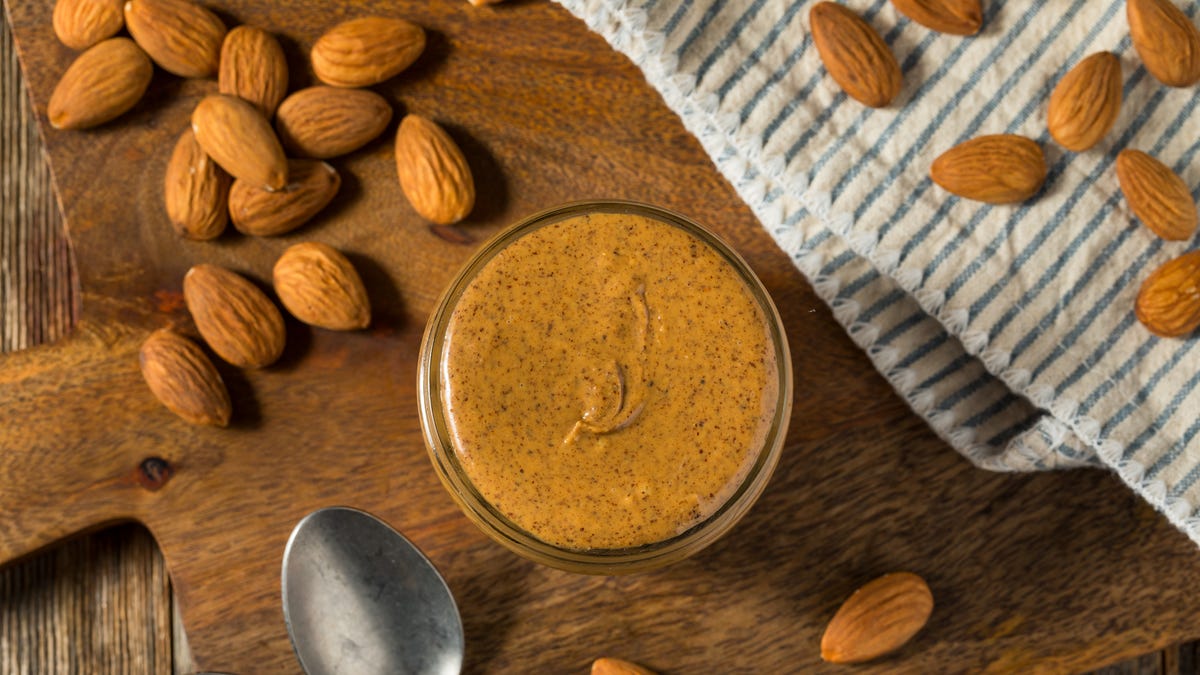
How to store organic nut butter the right way
Organic nut butter naturally separates since it contains no stabilizers, but with a proper stir and storage, you can keep it creamy and delicious.
Whether it’s cream cheese on a bagel, jelly on toast or a little mayo in a sandwich, most of us enjoy a good spread. After all, these familiar favorites often define our breakfasts, lunches and snacks.
But more people today are looking for healthier swaps like low-fat mayo, organic jellies or Greek yogurt, especially when trying to cut down on calories, added sugars or saturated fats.
Enter almond butter, “a creamy alternative to classic peanut butter that provides more versatility with a similar nutrition profile,” says Kristina Cooke, a licensed nutritionist and registered dietitian with the Academy of Nutrition and Dietetics. The smooth spread has become so popular that it’s expected to reach a worldwide valuation of nearly $1.3 billion by 2035.
Here’s what almond butter is, how it can be good for you and why moderation still matters.
What is almond butter?
Almond butter is a creamy spread made by grinding whole raw or roasted almonds into a smooth or slightly textured paste. As the nut breaks down, its natural oils are released, creating the creamy consistency of the “smooth nut butter we know and love,” says Cooke. Some brands also add a touch of salt or oil, but the healthiest versions are single-ingredient butters made from almonds alone.
Almond butter is known for its rich, nutty flavor with a hint of sweetness; and its texture can range from silky to slightly gritty, depending on how long it’s been ground. Almond butter comes in similar varieties to peanut butter: smooth, crunchy, raw, salted or unsalted, with roasted versions especially popular for their deeper, toastier flavor.
And while almonds have been cultivated for centuries across the Mediterranean and Middle East, almond butter is a relatively modern creation. Today, major almond-producing regions such as California, Spain, Australia, Turkey and China supply much of the world’s almonds and almond butter.
Is almond butter healthy?
For being such a delicious spread, almond butter delivers a surprising array of nutrients, especially when you choose versions without added salt, sugar or oil. One of its standout features is its high level of monounsaturated fats, the same heart-healthy fats found in olive oil. “These fats are associated with lower cholesterol and improved heart health,” says Cooke.
It’s also an excellent source of vitamin E, “a potent antioxidant that supports cell protection, skin health and eye health,” says Abbie Gellman, a registered dietitian and New York City–based chef. Almond butter provides plenty of magnesium as well, “which supports muscles, bones and the immune system,” Gellman adds. The mineral also helps regulate blood sugar, nerve function and bone strength.
The spread’s high fiber content, between 3 and 4 grams in just two tablespoons, promotes a feeling of fullness and supports digestive health. And at roughly 7 grams of protein per two tablespoons, almond butter is also a solid protein source, especially for those on a plant-based diet. “It can be layered in with other sources like beans and whole grains to help you achieve your daily protein needs,” says Cooke.
Can you eat almond butter every day?
Despite its many benefits, portion control still matters. “At nearly 100 calories per tablespoon, almond butter is considered calorically dense,” says Cooke. And although its fats are healthy, excessive intake can still contribute to unwanted pounds. “If you’re aiming to lose weight, you may want to stick to around one tablespoon at a time,” she advises.
Some people also experience digestive discomfort when eating almond butter due to its high fat and fiber content. And because almonds contain oxalates, overconsumption of the butter poses a kidney stone risk in susceptible individuals. Salted versions of the product can also pose issues for those with high blood pressure, “so it’s best to choose one that’s low in sodium,” advises Gellman. Of course, anyone with a tree-nut allergy should avoid almond butter altogether.
When such considerations are kept in mind and the spread is enjoyed in moderation, however, Cooke says almond butter is “a nutrient-dense food that can absolutely be part of a healthy, balanced diet.”

